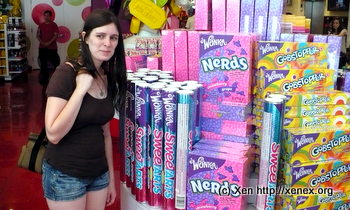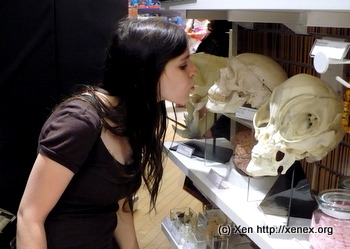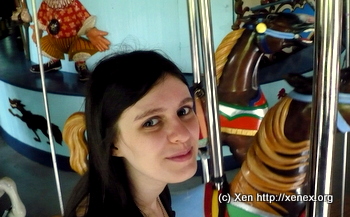
Ritual Gestures ««« 2012 »»» Lake George Magic
07.03.12
-John Updike
Hemingway described literary New York as a bottle full of tapeworms trying to feed on each other. When I write, I aim in my mind not toward New York but toward a vague spot a little to the east of Kansas. I think of the books on library shelves, without their jackets, years old, and a countryish teenaged boy finding them, have them speak to him. The reviews, the stacks in Brentano's, are just hurdles to get over, to place the books on that shelf.
Cityitis

| |
|
|
I do not understand how anyone navigates Manhattan in the summer without needing by the end of the day a saline drip filled with antibiotics and a capable masseuse. At the very least, there should be a pint of competent chicken soup waiting when one returns home.
Part of the issue is that maps of New York City make distances seem minor. I have walked seven country miles with Amber at my side and thought little of it, aside from realizing we were quite lost and the sky was getting too dark for comfort. The space between Grand Central and The Natural History Museum is a matter of blocks, as far as I can determine, and it seems petty and weak to take the subway when we are vigorous and healthy adults on a summer day.
Almost always when I have visited the City previously, I have done so with a skilled navigator by my side, someone who has a bit of Manhattanite in their blood, someone who can say things like "the streets run that way, the avenues this, and you are going to be fine" and make me believe them. Someone, I suppose, who would be willing to tell me that "a few miles" in the City are a far more daunting prospect than strolling around my rural neighborhood for an hour and I should give up my autonomy to the subway.
I am not comfortable being the one to decide when it comes to Gotham. Let me toddle after someone who has a direction in mind, trusting them as I trust airline pilots not to kill me. Nevertheless, I picked a few points on the map I recall as being worth our time, though I acknowledged not knowing their location beyond a borough. I chose Natural History over Modern Art simply because it seemed perhaps closer to Grand Central Station - effectively home base, because I know it will bring me back to safety as long as I retain my return ticket - and I know more about mastodons than Monets. Secondly, I hoped to find FAO Shwarz, a toy store so imposing as to have made its way into the plot of an eighties movie (Big). Finally, I hoped to eat somewhere that is slightly more upscale than Five Guys. If I could manage these three things, I would consider this adventure a rousing success.
Once we arrive in Grand Central Station, Amber is insistent upon her being fed. We cycle around the provided dining options once - within a small concourse, one can get everything from pizza to goat to fried plantains to sushi - and she refuses to select anything. I am not as hungry as she is and am carting a satchel full of snacks, so I select for us two toasted bagels with cream cheese - sufficiently local cuisine - and I offer her some beef jerky from my bag to supplement protein. We find a corner seat and two suited men promptly sit beside us and talk of various New Jersey girls they have tagged and discarded like so much refuse. Through squinting and small nods, I want to convey to Amber that I would be more inclined to believe their stories if they afterward grew wings and burst into flames, but they seem to enjoy goading one another into further lies about their studliness. These two represent to me one of the native species here, men in pricey looking suits with nebulous job who deal with their own depersonalization by objectifying others.
I have two weeks off of work, whether I wanted them or not, as my facility transitions into summer school. Amber and I have tried to pack activities into every other day so as to not burn ourselves out utterly. We were due cityward days ago to visit my friends in Brooklyn, but a bad turkey sandwich eaten at the Millbrook Zoo (or intestinal monkey pox from trying to get a gibbon to play with me through the bars) waylaid me. Amber's sister Rebecca wanted to join us, altering our plans to the more touristy, but canceled at the last moment (almost literally, we were three miles from her) owing to an injury of her own so we persisted as tourists.

| |
|
|
After lunch, Amber's phone insists we are a car and unable to walk down one-way streets, so the most exact directions we can suss out involve pretending we have to obey road signs. We get lost on our way to the museum, though we coincidentally end up near FAO Schwarz. I have primed Amber for a magical childhood experience, rife with giant robots and candies in every color and flavor. We are greeted with instead is an average sort of toy store. Yes, the door is opened by a resentful man dressed in a toy soldier costume despite the heat, but there is nothing magical. Perhaps the internet has desensitized me to life-sized zebra dolls and candy bars so large that their caloric content is rendered with multiple commas, but I feel the need to apologize for building up Amber's expectations. Not just for FAO Shwarz apparently having been bought out and gutted - I can find no other excuse for the lackluster amount of fun to be had - but that this trip is not building itself to be an amazing experience that will foster memories for years to come. I grasp that FAO Shwarz is more keen on the highest profit, however.
We leave and I am a bit annoyed that the City has been so unaccommodating to my entertainment so far. Isn't that they whole point of a place like this? Why else would so many spend so much money to be cramped together and annoyed if it isn't for my personal enjoyment and edification? There is so much to do here, one never need experience a moment of boredom. I have heard more than one person mention that the only way cities make sense are as a sort of virus, that humans are infected and told to build unpleasant cages that no one should want to live in. Or maybe cities are a pyramid scheme: everyone is supposed to be there, I am an everybody, so I will move here. That does account for the endemic poverty, people living well beyond their means because this is where the jobs are (and the jobs being there because the people are there to staff them).
Amber suggests we cut through Central Park to get to the museum, though this is not a prospect I really understand. I've been in Central Park, of course, but it suffers from the same spacial dilation that affects everywhere else in the City. Emily once repeated a story that her father told about Central Park containing a swallowed up extra borough. I am not eager to trip and fall into another dimension.
We cut through a corner, going no deeper than would allow us to see the perimeter wall. Despite this being a Monday, we interrupt a wedding reception taking place an abandoned gazebo. To their glares, I want to point out that it is a weekday and they are in a public park, but this harassment might be enough to infect me with the city-building virus.
Though the afternoon is growing later, when Amber happens upon a carousel, I know we have to stop. For a moment, I am annoyed at this interruption of our quest to the museum - likely the early onset symptoms of cityitis, valuing deadlines above people - until I mentally smack myself. Riding a carousel with a beautiful woman on a summer's day in New York City is precisely what builds lasting memories.
We do find the museum with an hour and a half to spare before it closes. It is not enough to enjoy in its fullness, but that is the fault of my stubborn belief in my navigational skills. We reach the kiosk and the person behind the register begins his spiel.
"This is a museum, right?" I ask.
"Yes?" he says, rightly regarding me as though I may be mentally deficient.
"And I would give you a donation, is that also correct?"
He nods.
"So, if I were to give you, let us say, ten dollars, that would be okay?" Whether or not it is, that is all he is getting.
"That is fine," he says, I think grateful to have gotten any money at all out of us.
We dart through the museum. We arbitrarily pick things to find - the whale under which everyone sits, an australopithecine, a megatherium - and miss much in between. We look over the geologic samples and I ask which I would have to steal to be worthy of Amber's hand in marriage. She is torn between a diamond the size of my eye and a meteor with iron enough to make a truck, if just for the challenge of secreting it out. The museum is crowded with tourists (not that I am one to complain), my camera decides to choose here to give up its ghost, I am irritable with dehydration, and we hardly have time to really take anything in, but I am happy to be in one of the gems of the City. We peek out of a window the size of the building in which we live and there are children pressed against it, ignoring the representations of planets and moons so that they can splash about in a puddle that reaches past their knees. I love them a bit for it. Most people in the City are as good as those outside, if forced to adopt a protective carapace if just to cope with the overabundance of stimuli.

| |
|
|
I want to love the City. It contains so much that is good. There is an electricity to even the dullest day here that overpowers even its clinging aroma. Several friends of mine have moved cityward, rarely to be seen or heard from again, each acting as though they have relocated to Shangri-La, despite muggings and struggling for every dime they make. Maybe they have been infected with some brain parasite, but they seem to have reached a personal fulfillment aided by the urban jungle. Maybe they are just glad that they have access to all the shopping and culture one could ever want. People here might live in closet, but they are envied for it.
The attendants all but shove us out of the museum, as though we had missed their automated broadcast in ten languages. We have a few hours until sunset, though they never seem enough here. Even the quality of sunlight, defused and reflected by monoliths that would outshine primitive idols, is a bit alien. Once the sun goes down, I would like to be on a train headed back to the Hudson Valley, watching the dark river shooting by at sixty miles an hour. However, I have promised Amber dinner and I will not welch on it.
Her phone insists that Sammy's Noodle House - my Chinese food mainstay in the City - is not a real destination. This is possible, it has been several years. I think better of asking it to direct me to one of the other tourist trap restaurants I trust by virtue of having been there once, and instead we agree to follow a straight line toward where we assume Grand Central to be until we either find an eatery worth the time or are picked clean by the vultures.
We pass by several that are attempting to be upscale in pricing, if not ambiance, before conceding defeat at a burger joint. It seems to be a chain restaurant, one that espouses to be "roadside" but only exists in Manhattan, and is not better than Five Guys (though I won't disparage a fried portabella cap on top of my burger). It is packed beyond reckoning, a fact it brags about, but is kind enough to feed us for under $50 and give us an air conditioned place in the basement to sit for a few minutes. We are not fancy people.
We kill a bit more sunlight by stopping at a gallery. It is not large or beautiful. The art is bland, but Amber says she cannot go to the City and not visit one. What is remarkable is that it is staffed by a Hollywood designed gay man and a woman so beyond gorgeous as to transcend sexiness. Their job, after telling me that I am not permitted to carry a paper cup full of ice into their gallery, is to follow Amber and me around and pretend this is not what they are doing. They talk of unrelated subjects, never taking their eyes off of us in case we should wish to apply fingerprints to the displays, but could have saved themselves time by standing very still and letting us scrutinize the woman. Her coworker can be occupied mopping up drool. If this gallery had any sense, it would do away with the bad art and simply have her stand on a pedestal and look haughty for donations. They'd own the block within the first year.
The City seems rife with these people, those so eerily constructed that it is all one can do not to stare. They hardly seem real and they exist almost nowhere else. If she settled in Westchester, she would be a goddess and would have to employ followers to swat away onlookers. Instead, she is in the City and works a job that cannot possibly pay enough to justify her tailored outfit at a gallery no bigger than a bodega. There is something to be said for being the small fish in the big pond and her dating prospects would approach zero in a place without a pool of millions, but this seems like burying a diamond among plastic gems. Perhaps this is simply the only place they feel they can thrive, so they abandon Calcutta and Paris, Melborne and Cape Horne to spend time as waitstaff to gawking tourists. Or the city virus is far more insidious and hopes to use them as bait...
Amber brings us back to the station as night settles on the City, minutes before the next train upstate. We dash into the first car as though it might leave without us, one full of the dank air of the tracks. In the seat before us is an attractive, if ostentatious woman, who tries to make sure everyone in the car not only hears but sort of adores her. Her friend, whose name I do not catch, either tolerate this display or admires it, for which I cannot blame her. She is charming enough, as she throws questions our way to make sure we aren't distracted by books or writing, that we ignore the fact that the air conditioning does not come on. Through her flirtations with an amenable conductor and her monologues, we discover that she lives only a few stops away from where we are getting off, that she commutes four hours a day to get to a job in the City that she is sure is going to be her ticket to fame and success (or a rich husband), that she has no real attachment for the town of her birth and spends her every spare moment on the train coming to or leaving from NYC. She badgers her friend to get an apartment with her, but this one-sided debate has the texture of a well-rehearsed piece; she has no chance of living in the City right now, but wants people to believe that she is always a month away from a SoHo studio. She is in the late stages of cityitis and, like syphilis, it will push her brain to a frenzy of thoughts before burning out.
I am content to sit with Amber's head in my lap and watch the lights of the City fade.
Soon in Xenology: Male friendships. Lake George. Burlesque. Melanie.
last watched: 30 Rock
reading: The Girl Who Circumnavigated Fairyland
listening: Ellen McLain
Ritual Gestures ««« 2012 »»» Lake George Magic
Thomm Quackenbush is an author and teacher in the Hudson Valley. He has published four novels in his Night's Dream series (We Shadows, Danse Macabre, Artificial Gods, and Flies to Wanton Boys). He has sold jewelry in Victorian England, confused children as a mad scientist, filed away more books than anyone has ever read, and tried to inspire the learning disabled and gifted. He is capable of crossing one eye, raising one eyebrow, and once accidentally groped a ghost. When not writing, he can be found biking, hiking the Adirondacks, grazing on snacks at art openings, and keeping a straight face when listening to people tell him they are in touch with 164 species of interstellar beings. He likes when you comment.